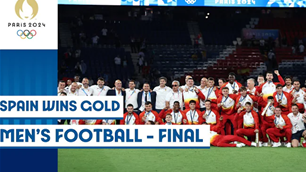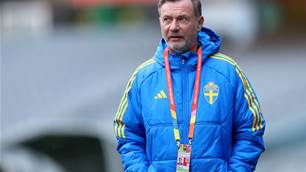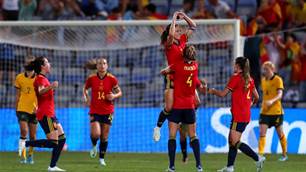GERARD Pique - an integral part of both Barcelona’s and his country’s recent tsunami of success – has heard the whispers... Yes he’s fantastic on the ball, yes he has won everything but it's been asked: Is he defensively strong enough - and is he even too nice?
Is he the weak link the Socceroos could exploit when they meet Spain in the World Cup next year? We spoke to him to find out what makes him tick - and how he copes with the expectations of being part of arguably the two most successful squads in the world right now.
Do the jibes get him down? “It's not worth it,” he says. “The press is ultimately for the fans, for all those millions of people who live and work for it and I think that we as players cannot control the press nor should it affect us, far from it. Whether it's good or bad, because good press can also perhaps make you think you're something you're not.”
What Pique certainly is, is a winner and a winner of the serial variety. La Liga titles, Copa Del Rey medals, Champions Leagues, World Club championships, the Premier League, European Championships and the World Cup. Not bad for a 26-year-old and the kind of medal haul that a defender blessed only with style over substance simply wouldn’t have won. You need steel to your game and to your character to reach these heights, an inner-confidence that is certainly evident with the central-defender.
“I think that confidence is the most important thing for a sportsman,” says Pique. “Whether they are a footballer, a basketball player or a tennis player, ultimately, for all the talent you have, if you don't have the confidence that gives you the assuredness to perform, you're not going to make it, regardless of your skill.”
Pique had the confidence as a young footballer to pack up and leave Barcelona’s youth ranks for England, joining Manchester United aged just 17. There he learnt his trade, had a loan spell back in Spain, won honours under Sir Alex Ferguson and then in 2008, returned to Spain and broke into a Barcelona team about to sweep all before them.
An elegant and accomplished footballer more than capable of starting Barcelona’s attacking movements, Pique is also a quietly determined defender who does the nitty-gritty so that others can shine. If the likes of Andres Iniesta and more recently Neymar are the beautiful swans of he team the likes of Pique and Sergio Busquets are the unseen busy legs frantically making things happen under the surface.
He told us more about his career and self-confident as he promoted Nike's new Tiempo boot.
This Nike Tiempo campaign is all about leadership, confidence and also rebelliousness. Leadership is obviously an essential part of being the first choice centre-back for Barcelona and Spain.
Yes. I think that in the centre-back position you can see the whole game from the back, and you see the shape of the midfielders, the forwards, your full-backs. Ultimately a team needs organisation, and that organisation is given by people who can see the game and understand it, and from there give orders. I think this is one of the centre-back's most important roles.
How much did you learn about leadership from Carles Puyol?
He's been playing at the highest level for many years. He's an example to all those youngsters who come through the ranks and I was one of them when I joined Barcelona at the age of 21. He has taught me a lot, just like he's taught others. He's a bit of a father figure to everyone. He's got leadership and rebellious qualities; something which he regularly conveys. Especially when the team aren't playing well, when we feel as though things aren't going well on the pitch he's always there to gee everyone up and get everybody involved in the game.
You aren’t the captain but you are very much a leader with plenty of responsibility. Do you thrive on that?
Yeah, I've been passionate about football from an early age and I think that when we're on the pitch we have to give everything to achieve our aim. If it's a cup-tie, to make the next round, if it's a final, to win it, or if it's the final league game of the season on which everything is up for grabs. At the end of the day it's about performing to your best and doing everything to win. And I believe in the emotional side of things. Ultimately, if it's only about playing football and something as basic as this, I think it loses a little of the fun and the emotional element that makes it so wonderful. At the end of the day it's the fans that love it and pay for it and we do have a responsibility to them as well.
How do you prepare for a big game?
I try to switch off as much as I can. I mean, it's much better if I'm not thinking about the game an hour before it starts. As soon as I enter the dressing room, that is when I focus 100 % on my opponent, how we're going to approach the game, the thousands of things that have been worked on and studied in order to play the perfect game. But it's true that in the team hotel the day before, it’s important we try to switch off, talk about something else, play cards, whatever, anything to not think about the game, because ultimately, as much as you think about it, it all depends on the talent and work that you put in on the pitch.
What about press criticism? How do you deal with that side of things?
It’s not worth letting it get to you. The press is ultimately for the fans, for all those millions of people who live for football, and I think that we as players cannot control the press nor should it affect us, far from it. Whether it's good or bad, because good press can also perhaps make you think you're something that you're not
Back in 2011 tension was high between the Barcelona and Real Madrid fans. How did you cope with that and make things better for the national team?
I remember that there was a bit of tension. I think it was after the 5-0 game at the Nou Camp and there was a bit of friction there. But it was water off a duck's back once we were together in the national team. I think the team, both the players from Barça and Madrid, understood that it was the national set-up and that we had to be united or we wouldn't achieve our aims. The Euros were round the corner and we focused on that. It's obvious that there are people who perhaps get on better with some rather than others, but that's the same in any team, any company, and the aim must be to achieve the same objective.
Let's talk about the values we mentioned earlier: confidence. You had to go to Manchester first, then to Zaragoza in order to finally end up at Barça. When you left, did you believe that you could come back to Barça and be as successful as you are?
Certain things have to fall in place. The fact that they were scouting me again, that you were playing well for your team and then finally that they reach an agreement, because, when you're at another club, coming back to Barça is something you hope for, but at no time is it a clear objective. You always try to work hard so that, in this case, Manchester United played well, because they were my team. However, the opportunity came up and from then on I worked hard to return. It has been great since I returned. This is my sixth year, and I think we've won at least one trophy a season, and more than one on many occasions. Our haul is spectacular and we've got a team that can continue in the same vain.
Do you think people are aware of the effort that goes into being a footballer at Barcelona?
I think that some people do but perhaps there are others that only see the footballer that takes the field and plays 90 minutes, thinking that's the job done and the only thing we do. There is much more that lays behind it and I'm convinced that some people who understand, or at least that follow football and who know that it's a daily job in which you don't only have to train or play a match, but also many other things.
Many people couldn't believe it when they read that you had taken the first penalty in your professional career in that shoot-out against Portugal. You have to have lots of confidence to take that penalty at that precise moment don’t you?
Yeah, I think that confidence is the most important thing for a sportsman. Whether they are a footballer, a basketball player or a tennis player. Ultimately, for all the talent you have, if you don't have the confidence that gives you the assuredness of being what you are you're not going to make it, regardless of the talent you have. And I think that footballers, professional sportsman of any kind for that matter, need that confidence to perform to their best.
We asked Sergio Ramos about that penalty that he took like Panenka. What did you think when you saw him take it like that or indeed, that it was Sergio who was going to take it?
Well, I didn't know he was going to take it like that, but he did, in it went in and we went through to the next round. It has its risks, but ultimately simply taking one has its risks, because the goalkeeper can save it or you can miss it and you end up being the villain. But it didn't turn out like that. He scored his, and I scored mine. The team went through and that's what matters.
How would you like to be remembered?
As a passionate person. I'm head over heels in love with F.C. Barcelona, because from the earliest of ages I've gone to the Nou Camp and all my family have made me love this institution to which I owe everything, and for the fact that every time I've taken to the field I've given everything.
Related Articles

Spain complete golden summer with victory over France

Spain, Sweden set for high pressure World Cup semi













